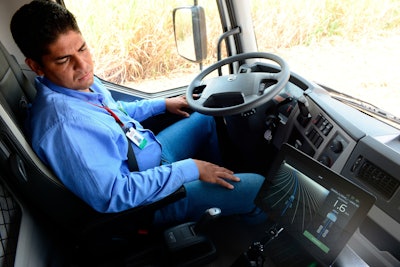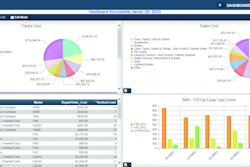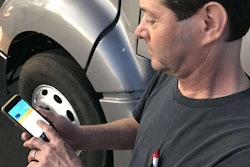
Used to transport newly harvested sugar-cane, the truck is steered through the fields in order to avoid damaging the young plants that will form the next year’s crop. Currently, about 4 percent of the crop is lost annually as young plants are run over and the soil compacted by moving vehicles, meaning thousands of dollars in lost revenue per truck per season.
In Maringá, an hour’s flight west of São Paulo, the Usina Santa Terezinha Group produces sugar and ethanol from its own sugar-cane crops and the company’s fields have served as a test area for a prototype vehicle from Volvo Trucks.
The self-steering truck was developed to examine how automated driving can make it possible to avoid damage to soil and crops, thus boosting revenues. The potential for bigger harvests is significant – up to ten tons per hectare per year.
Santa Terezinha’s Finance and Procurement Director, Paulo Meneguetti says, with the help of Volvo Trucks’ solution the company can increase productivity for the entire lifecycle of the sugar-cane plant, which lasts five to six years.
At present, sugar-cane is brought in from the fields using harvesters and manually controlled trucks, which drive alongside each other at a low speed. When a truck is fully loaded and drives off to empty its load, the next one moves up next to the harvester and the procedure is repeated. The challenge for the truck driver is to match the speed of the harvester and at the same time concentrate fully on driving in its tracks, so as not to trample the nearby plants that will become the following year’s crop.
Volvo Trucks’ driver assistance system automates steering, ensuring that the truck maintains its course alongside and away from the harvester, so that the plants are not damaged by trampling. With the help of GPS receivers, the truck follows a coordinate-based map across the sugar-cane field. Two gyroscopes ensure that not only the front wheels but the entire vehicle is steered with precision, to prevent the truck from veering more than 25 millimeters laterally from its set course. When loading, the driver can choose to regulate speed with the help of the vehicle’s cruise control, or to accelerate and brake manually. Since the driver is released from the burden of the concentration-demanding and tiring high precision steering process, it is easier to remain focused and work in a more relaxed and safe way throughout the shift.
“With this solution we will soon be able to significantly increase the productivity of our customers in the sugar-cane industry. At the same time, we will improve their drivers’ working conditions and safety,”says Wilson Lirmann, president of Volvo Group Latin America. “This in turn will make the job more appealing, and make it easier to recruit and maintain drivers.”
This summer the research project will transition into the product development phase, with more vehicles being field-tested. After that, the solution can be expected to become commercially available in the foreseeable future, Volvo says. Already this year Volvo Trucks Brazil will offer its VM customers in the sugar cane industry an advanced GPS-based map-reading system that gives the driver far better scope for maintaining a predetermined course, even though actual steering will still be handled manually at this stage.
The self-steering truck being used for sugar-cane transport is one of Volvo Trucks’ research and development projects for automated vehicles. Tests are currently under way on an autonomous truck for mining operations in the Kristineberg Mine in northern Sweden, and an autonomous refuse collection truck is being tested in Gothenburg, Sweden. The aim is to evaluate how systems with different degrees of automation can contribute to higher productivity, a better working environment, and improved safety.











